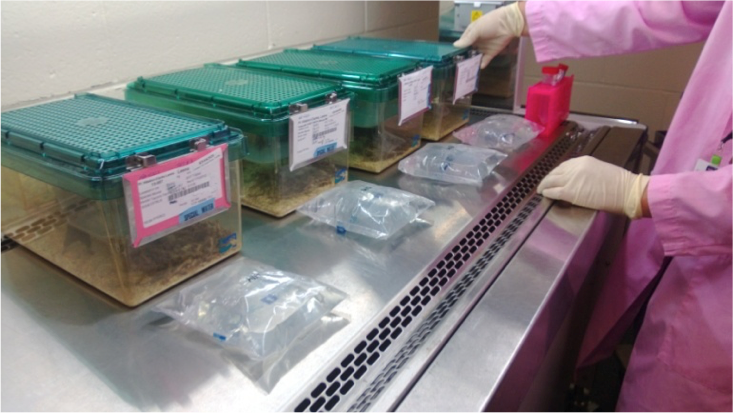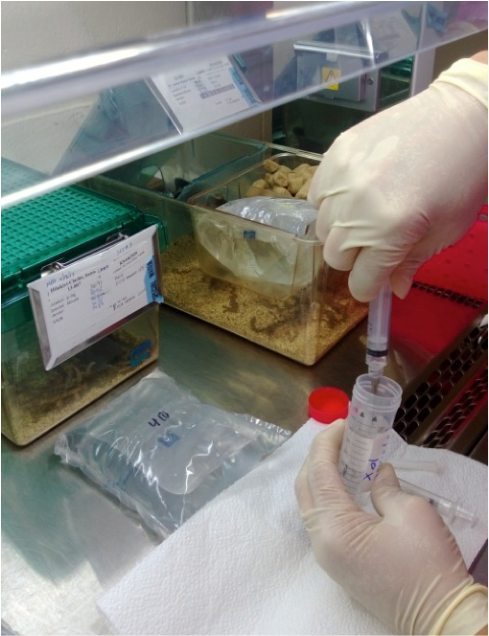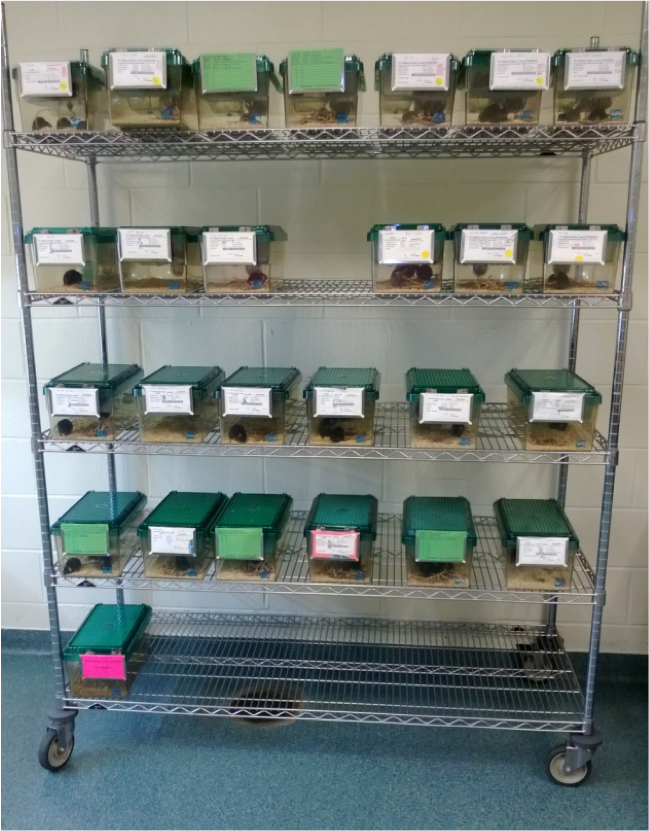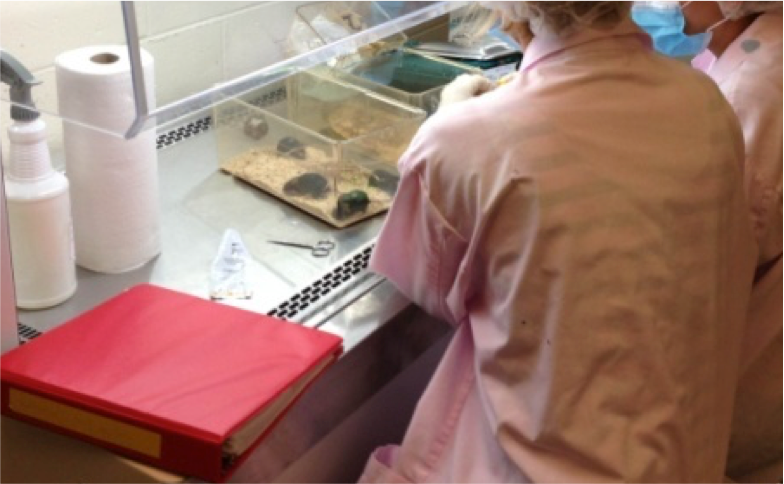AMSR Rodent Core Services
Placement of Animal and Specialized Diet Purchase Orders
All animal purchase orders from Lombardi investigators can be processed through the AMSR. Coordination of ordering through the AMSR allows economies of scale by consolidation of orders thereby minimizing shipping costs, and facilitates the optimal use of surplus animals. Special diets also are ordered through AMSR. We advocate the use of semi-purified AIN93M (maintenance) or AIM93G (growth) diet, which is not provided through DCM (DCM feeds animals Purina 5053 Lab Diet Chow, which contains high, but variable levels of phytochemicals shown to reduce tumor initiation and growth. ½ hr fee is charged for placing these orders.
Experimental Manipulations via Diet and Drinking Water
As specified by the investigators, AMSR staff will administer animals special diets, such as those containing different types and amounts of dietary fats, energy restricted diets, or diets supplemented with phytochemicals or vitamins. Some standard cancer treatments, such as endocrine therapy, is also provided through diet. Further, silencing or overexpressing genes in genetically modified mouse models can be initiated via exposures of for example tamoxifen in a diet. Some experimental manipulations can be administered through drinking water; these include histone deacetylase and DNA methyltransferase inhibitors. Administration and tracking of the use of experimental diets and fluids by the AMSR staff ensures that exposures through diet or drinking water follows approved protocol, and that diets and fluids are stored and handled appropriately.


Colony Maintenance
The AMSR technicians provide ear tagging for rat and mouse pups, body weight measurements, and litter weaning services upon request.

Genotyping
AMSR technicians will obtain tail samples from transgenic and wild-type mice upon request.
Administration of Carcinogens, Chemotherapeutics, Hormones and Growth Factors
The AMSR staff administers carcinogens, such as DMBA, to animals to induce tumors, and administers animals with drugs, hormones, or other compounds that may modify tumor initiation, progression and metastasis. All procedures are done according to approved experimental protocols, and the expertise of the AMSR staff ensures that data of the highest quality can be obtained. Advice of the route of administration is provided (oral, i.p., etc). Some therapies can be given via feed or drinking water (see Experimental Manipulations via Diet and Drinking Water)
Tumor Monitoring
Tumor measurement data are recorded for investigators in accordance with each experimental protocol. Consistent, expert measurement of tumors by AMSR staff ensures data quality and the maintenance of the data acquired in the AMSR records provides independent backup of the primary data.
Tumor Harvest: Necropsy and Collection of Tumors, Organs, Tissues and Blood (Sera/Plasma)
Depending on the experimental protocol, AMSR staff will obtain tumors, blood and other tissues for investigators at the time points requested. AMSR staff consults and coordinates with the Histopathology and Tissue Shared Resource (HTSR) staff to ensure the optimal harvesting and subsequent handling of all the materials (e.g., storage in freezer versus refrigerator; processing tissues for formalin embedded blocks, etc.).
Surgical Procedures
AMSR provides investigators with a variety of surgical services including orchiectomy, ovariectomy, skin grafting, mini osmotic pump implantation, and sustained-release pellet implantation. Other techniques are performed according to the experimental protocol (e.g., tail and retro-orbital bleeding, and terminal bleeding by cardiac puncture). These services provide investigators with the ability to access complex surgical interventions that they may not have the skills to conduct themselves. Microsurgical instruments and assorted surgical supplies (e.g., anesthetic devices, animal balances and anesthetics) are available from the AMSR on request, facilitating investigator access to specialized equipment.
Inoculation of Tumor Cells and PDX into Animals
The resource technicians are trained to perform subcutaneous (SC), intramuscular (IM), intravenous (IV), intratumor (IT), intraperitoneal (IP), and intracardiac (IC) inoculations of tumor cells on rodents. In addition, tumor debulking, splenectomy (to modify immune environment), and tumor cell subcapsular renal implantation are performed. Cancer cells for xenografts (between different species: recipient mice have to have suppressed immune system) or allografts (host and recipient have same genetic background: syngeneic mice can be used) are provided by individual investigators, and all must be tested and shown to be free of specific mouse or other pathogens before introduction into the Resource. Advice also is provided concerning the most appropriate cancer cell lines or PDX tumors to be used to test investigator’s research questions.
Routine Health Examinations
All animals are housed at the DCM and therefore examined at least once daily by the DCM staff. If more frequent or specific health monitoring is required, as outlined by investigators and their approved GUACUC protocols, our AMSR staff will provide the examination. If needed, animals are treated by our staff as recommended by the DCM veterinarian. The daily monitoring of animals (including weekends and holidays by DCM staff) provides investigators with invaluable timely information about the health status of the animals on their studies, ensures that animals receive optimal care and minimizes data loss.
Fees to perform routine health exams by the DCM staff are included in DCM per diem housing charges. However, in case additional monitoring needs to be performed by our staff, standard hourly fee is applied.
Record Keeping and Provision of Primary/Untransformed Data to Investigator
We maintain records of all manipulations performed and data generated for investigators. Investigators will obtain copy of all data as it is gathered. A complete copy of all appropriate records is provided to each investigator at the end of each study.

Advice to Investigators on Matters Related to Rodent Experimental Design, Analysis of Data and Presentation of Results
This service provides the investigator with assistance in designing individual experiments, and providing advice regarding the best animal model to use, routes of administration of experimental drugs and other technical details. In addition, the AMSR provides the investigator with assistance with construction of tumor growth curves, and estimates of tumor doubling times. This service is generally provided in collaboration with the Biostatistics and Bioinformatics Shared Resource (BBSR), to whom investigators are referred as needed. Input from BBSR is of particular importance for investigators, both in generating appropriate experimental designs, e.g., providing power estimates for group sizes, and in analyzing the mature data at the end of studies.
Training
We provide training for Lombardi members as appropriate. For example, this resource has trained Lombardi members to perform some aspects of their own experiments and/or to assist AMSR staff when they are for example harvesting tissues from the user’s animals, weaning, or measuring tumor sizes and participating in tumor and tissue harvesting. Although AMSR generally performs gavage, ovariectomy, castration, and other complex or surgical procedures, upon request from users the manager or technical staff will train investigators to perform these tasks. Additional training also is available from DCM staff and courses offered by DCM (http://www.dcm.georgetown.edu) and on occasion from other Georgetown University faculty and staff. AMSR staff also attends regional and national American Association for Accreditation of Laboratory Animal Care (AALAC) meetings and can attend specific technical workshops or visit other laboratories to learn new procedures.
